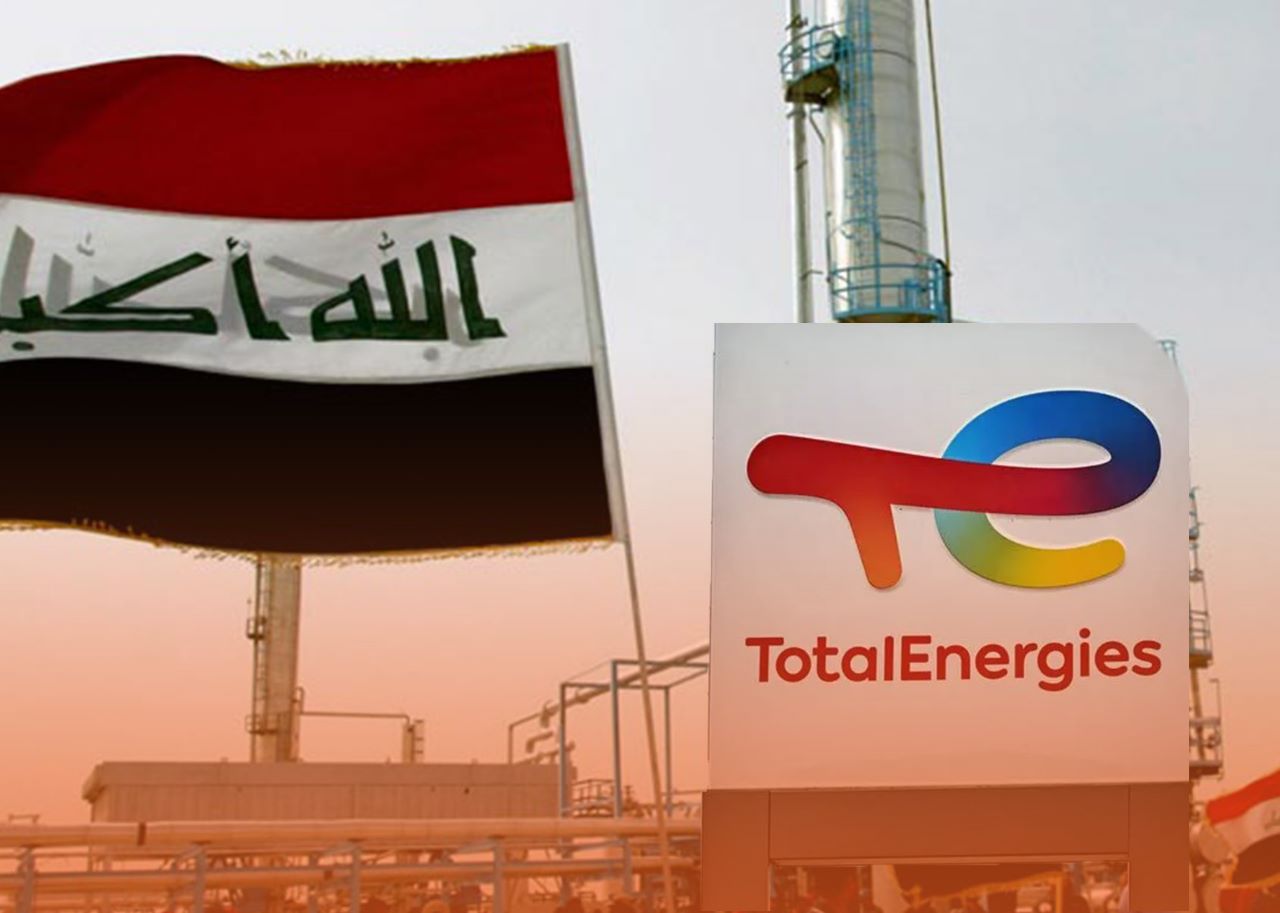Save for later
The agreement between the Iraqi government and TotalEnergies, signed on the 5th of April 2023, is the result of long negotiations held between the Iraqi Prime minister Al-Soudani and the CEO of TotalEnergies Patrick Pourranné. This agreement adopts the dispositions enunciated in the Development & Production Contrat signed in September 2021, and enables to fullfill the GGIP project (Gas Growth Integrated Project). This investment project signed in September 2021 between Total and Iraq was focused on 4 axes regarding gas, solar energy and water management in Basra. One of these projects also consisted in the increase of production capacities of the gas field of Artawi, at the center of the country, from 85 000 to 210 000 barrels daily. However, TotalEnergies kept its majority shareholding in this project, while the Iraqi government wanted to get 40%. In the end, both ends agreed on an Iraqi participation of 30%.
This Wednesday 5th of April 2023, TotalEnergie confirmed the participation of the Iraqi government of 30% through the Basrah Oil Company (BOC) in the GGIP project. Furthermore, TotalEnergie proposed the contribution of around 25% of QatarEnergy. Starting then, a consortium has been established, composed of TotalEnergies (45%), of the BOC (30%) and of QatarEnergy (25%). This is a long-term program, of 25 years, part of the Iraqi government’s commitment to provide the country with electricity. How will this energy investment project contribute to the economic transformation of Iraq, and what are its implications for the global energy industry?
I. Economic and geopolitical stakes
Since the end of the war in 2017, Iraq has witnessed a strong economic growth and a rise in electricity demand. Indeed, with a population of more than 40 million, Iraq is confronted to a rise in energy demand in order to support its economic growth and to meet the electricity demand of its population. However, Iraq is confronted to important challenges related to energy supply, such as the low production of electricity and the lack of energy infrastructure. Furthermore, electricity production in Iraq mainly relies on thermal power stations, fueled by natural gas, petrol and coal, which has a considerable impact on environment. The GGIP project has been conceived to take on these challenges by increasing the production of electricity in Iraq while reducing the environmental impact. Indeed, the agreement aims to capture the flared gas of the stations on three oil fields to fuel the electric power stations with gas, to build a sea water treatment plant in order to keep the pressure on oil fields and to increase regional production, as well as build a giant solar power station of 1 GW aimed to power the electrical network of Basrah’s region
The economic and energy implications of the GGIP project are significant. It should enable Iraq to become a major actor in the Liquefied Natural Gas (NLG) field by supplying a stable and reliable source of supply for international markets. Furthermore, it could also help in the local job creations and to improve the life condition of the local population by supplying reliable and affordable electricity. Finally, this consortium will help decrease the production of greenhouse gas with the capture of this gas, which is currently burned in the open, to produce electricity. This way, the agreement will contribute to Iraq’s energy transition and the UN’s target achievements regarding sustainability.
II. Partners’ role and contribution
The success of the GGIP project in Iraq depends on the contribution of each partner involved in the consortium. Indeed, each actor has an important role to fulfill to guarantee the project’s long-term success. The French multinational company, TotalEnergies, is still the leader of the GGIP’s consortium in Iraq. With a major participation of 45%, the company is responsible for the management and the coordination of the project’s diverse activities, among which the exploration activities, gas’ production and distribution, as well as construction and maintenance of water treatment and solar power station installation. The choice of TotalEnergies as leader of the consortium is based on its expertise regarding gas and petrol exploration and production, as well as its capacities to involve important fundings for energy-related projects on a big scale. The company has a significant experience in project management in Iraq, where it is has been operating for a few decades now.
The Iraqi state, represented by the Basrah Oil Company (BOC) is participating in the consortium with a share of 30%. This participation enables Iraq to benefit from TotalEnergies’ technological expertise and a savoir-faire, while guaranteeing a state presence in the project management. The participation of the Iraqi state reflects the commitment of the government to promote foreign investment in the country’s energy sector, while ensuring that her interests will be protected.
QatarEnergy’s involvement at 25% reflects the increasing interest of Qatar for developping renewable energies in the region, and reinforces the cooperation between the two counbtries in the energy field.
In short, the participation of each GGIP consortium’s partner in Iraq is essential to guarantee the long-term’s success. The combination of TotalEnergies’ expertise in gas exploration and production, the Iraqi state’s commitment and the increasing interest of Qatar for the renewable energies will answer Iraq’s increasing demand in electricity, while generating significant economical results for all parties at stake in this project.

III. Toward a major transformation of the global energy industry
The global energy industry is changing. The energy transition toward renewable energy sources is in action, but gas is a fossil energy that will play an important role regarding energy transition. The GGIP project in Iraq is important in this context because it will help to exploit an important source of natural gas which would otherwise be lost. This agreement is also important in terms of competitive position. With a planned production of 1GW, it will be the largest solar power station in the Middle East. It must be noted that the region of Basrah is a region with high insolation, which is a great asset for this project. Furthermore, QatarEnergy’s participation to the consortium is reinforcing the competitive position of the GGIP, since it is a major actor in the region’s energy industry. The GGIP project will enable to reinforce TotalEnergie’s position as a leader of the energy industry. Indeed, TotalEnergie’s participation in the GGIP project in Iraq will enable to reinforce its presence in the region and to diversify its sources of natural gas’ supply.
Finally, the GGIP will have an important economic impact for Iraq by creating local job opoortunities and stiumation Basrah’s economy. It will enable the supply in electricity for local poplation and reduce greenhous gas emission linked to the production of electicity fril liées à la production d'électricité à partir de ffossil fuels. This way, the GGIP project shows that natural gas stays an important source for energy transition. Projects on this scale can contribute to the reinforcement of competitive position of global actors in this field.
Conclusion
The GGIP has the potential to supply many assets for Iraq and for the global energy industry. Increasing Iraqi demand in electricity and the economic implications and energy of this project underling the strategic importance for Iraq’s future and for the region’s stability. The engagement of the Iraqi state and of QatarEnergy in this consortium ensures a significant contribution and a long-term engagement for the success of this project.
This agreement is also important because of the important of gas in the energy mix. The use of gas as a fuel of substitution, cleaner and more abundant than oil, is a key element for this energy transition. The GGIP project is an example of the involvement of energy companies to produces energy in a more sustainable and environment-friendly way.
The next steps for a successful implementation of the GGIP project involve a tight collaboration between the consortium partners, particularly the Iraqi government to guarantee that the project respect the strictest environmental, social and economic norms. The future challenges include getting the necessary licenses, as well as the construction of the necessary infrastructure and the guarantee of the workers’ safety on the field. It is thus important to keep a close eye on the next step of the project’s implementation.







